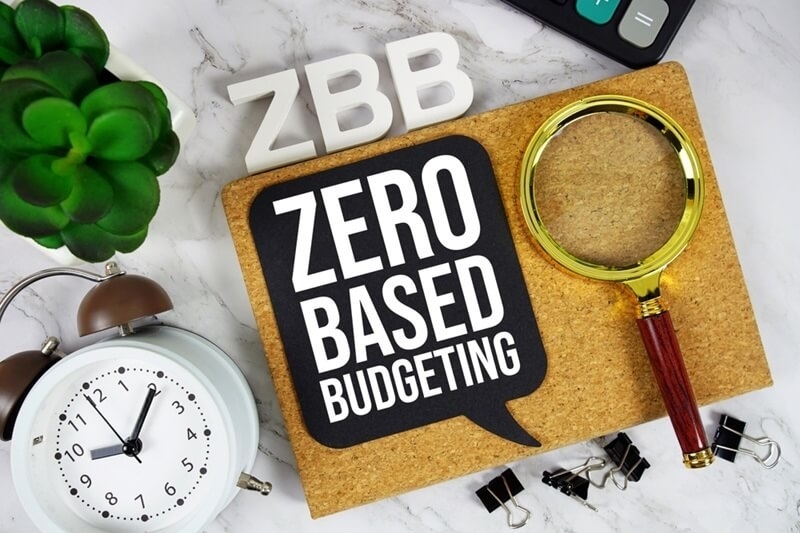
Being a master of money is usually a matter of having a plan. For some people, it's more a matter of how well they spend what they make rather than how they make it. Perhaps one of the easiest and most effective ways to be master of your money is zero-based budgeting. Zero-sum budgeting enables you to budget each dollar you make to know where it will be spent, saved, or invested, and nothing will go to waste.
This blog will demonstrate how to practice zero-sum budgeting, implement it, and utilize it for wealth accumulation. Single, couple, or household expenses, this budgeting method enables you to learn more about your money and make wiser fiscal choices.
Zero-sum budgeting is an accounting technique where you allocate an activity to each dollar earned until your income less expenses will equal zero. It does not necessarily mean you are spending every single dollar; it means you have allocated an activity to each dollar — whether for paying bills, saving, investing, or debt repayment.
Whereas with all other budgeting techniques, you can simply put down what you're spending, zero-sum budgeting makes you plan. Each month, you look at what you earn and deliberately determine how you'll spend each dollar. In this way, you can eliminate waste, slash unnecessary expenditure, and make sure you prioritize what matters most.
It is most people who are having trouble with money since they lack guidance and control over how they spend. Zero-sum budgeting solves this issue by making you think hard about your finances ahead of time. It makes you take a seat, compute your monthly income, and determine where all the dollars will go.
The benefits of zero-based budgeting are increased financial acumen, increased investment and savings priority, and decreased financial anxiety. Zero-sum budgeting eliminates guessing while dealing with finances and places it aside in conscious choices. Whether paying off debts, saving for a large purchase, or accumulating long-term wealth, this system provides you with an easy-to-follow rule to stick to.

Zero budgeting does not have to be difficult. You can do it on paper, with a basic spreadsheet, or with a zero-sum budget worksheet template. What follows is how you can make your own step-by-step.
Begin by writing down all sources of income that you get for the month. This includes your salary, any side income that you get, rental income, or any other money that you get on a regular basis.
Then, list all your typical expenses. They are rent or mortgage, utilities, food, transport, insurance, subscriptions, entertainment, and so on. Be as specific and realistic as possible.
Don't overlook your savings, investments, and debt payments. They are just as crucial as your monthly fixed expenses.
Now, take your total earnings and begin allocating them to each of these groups until you reach zero. That is the idea of zero-sum budgeting. Each dollar has to have a function.
It's advisable to picture zero-sum budgeting as a monthly routine, not something you do once a year. Applying zero-sum budgeting monthly implies that you check your revenue and spending regularly and adjust accordingly.
There will be new expenses or shifts in income every month, so spending a few minutes at the start of each month to update your budget keeps you on course. In so doing, you are able to anticipate unexpected expenses, set your goals, and flow with money movement.
Look over your expenditures at the end of the month to determine if you were on track. If you spent more or less in any category, make adjustments to next month's budget as needed. This makes you flexible and allows you to refine over time.
Family budgeting may seem intimidating, particularly when various family members have varied spending patterns or needs. This is why families adore the application of zero-sum budgeting. It puts everyone on the same page financially and encourages good money talks.
When budgeting as a family, all members, including children, should be involved in planning in a very basic manner. It has shared objectives and accountability. Begin with the basic expenditures such as shelter, food, and electricity bills. Then add savings objectives for school charges, vacations, or emergency reasons. Finally, spend on recreation, pursuits, and entertainment.
Households that budget as a group are more likely to discuss money better and spend it better. Getting everyone to use the same group zero based budget worksheet template can keep everything neat and concise for all.
You don't have to begin anew with this budgeting technique. Tools are easily available for a good portion of the time to help make it easy for you. A zero-sum budget worksheet template is an excellent one to use because it will provide you with a pre-created format to complete. These forms typically make room for income, expenses, savings, and debt payments, so you won't forget the basics.
Or, if you prefer using digital software, there are some zero-sum budgeting software available that you can specifically use for the same. These enable you to monitor your budget in real-time and adjust as you go. Effective budgeting apps have auto-categorization of expenses, goal creation, and graphical reports to motivate you.
YNAB (You Need a Budget), EveryDollar, and Goodbudget are some of the most popular zero-based budget software, which are computer applications through which you can remain consistent with your budget and form better money habits in the long run.
It is consistency that will make zero-sum budgeting effective in the long run. Although at first, the process of creating it might consume a lot of time, it becomes smoother the more you do it. In time, the process makes you think more deliberately about money, enabling you to build wealth over time without any distress.
Make budgeting a regular part of your routine. Set a day each month to prepare your budget and go over it each week to monitor progress. This will have you on track and catch issues before they become major problems.
As with any system, zero-sum budgeting has its weaknesses. Listed below are some common issues and how to overcome them:
If your income is different each month, budget for your lowest projected income. Any excess can be directed toward savings or debt repayment.
Something will go wrong. Include a small buffer category in your budget for unforeseen expenses. This keeps surprises from sabotaging your entire plan.
It will take some time at the beginning. Having a zero-sum budget worksheet template or a budgeting application will make it quicker and easier.
It is easy to overspend with money in your pocket. Going over your budget on a regular basis and tracking expenses keeps you accountable.
The advantages of zero-sum budgeting extend far beyond the mere timely payment of bills. This system conditions the right mindset for wealth building because it forces you to consider your money goals every single month.
You're not merely getting by every paycheck; you're planning ahead. You'll be more inclined to save, invest, and become debt-free because they're part of your monthly strategy right from the start.
There are several ways of budgeting, but zero-sum budgeting is superior to others for the simplicity and accuracy it offers. In contrast to processes that use spending percentages or individual guidelines, this process lets you be certain where your money goes.
It's anticipatory, not retrospective. You don't look to see where your money ends up after you spend it—you determine ahead of time where it goes. That kind of control is something that everyone who wants to accumulate wealth and live independently needs.
Long-term maintenance of zero-sum budgeting requires motivation, especially in months when it seems like an eternity since you last abided by your plan. To stay motivated:
These small steps can keep you on the right path and remind you constantly of the bigger picture.
Zero-sum budgeting is not an accounting method—zero-sum budgeting is a philosophy. It forces you to actually consider each dollar earned, and it causes you to make wiser financial decisions. Budgeting for a single individual or implementing zero-based budgeting in households, the discipline instills order, simplicity, and peace.
By regularly implementing zero-based budget monthly, using helpful resources like a zero-sum budget worksheet template or software for zero-sum budgeting, and staying consistent, you’ll build stronger financial habits and move closer to your wealth-building goals.
This content was created by AI